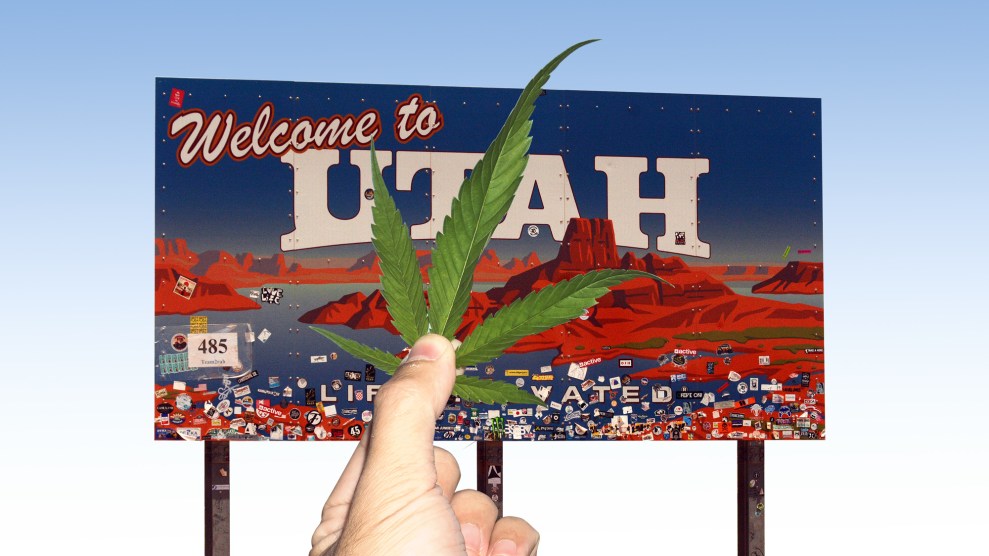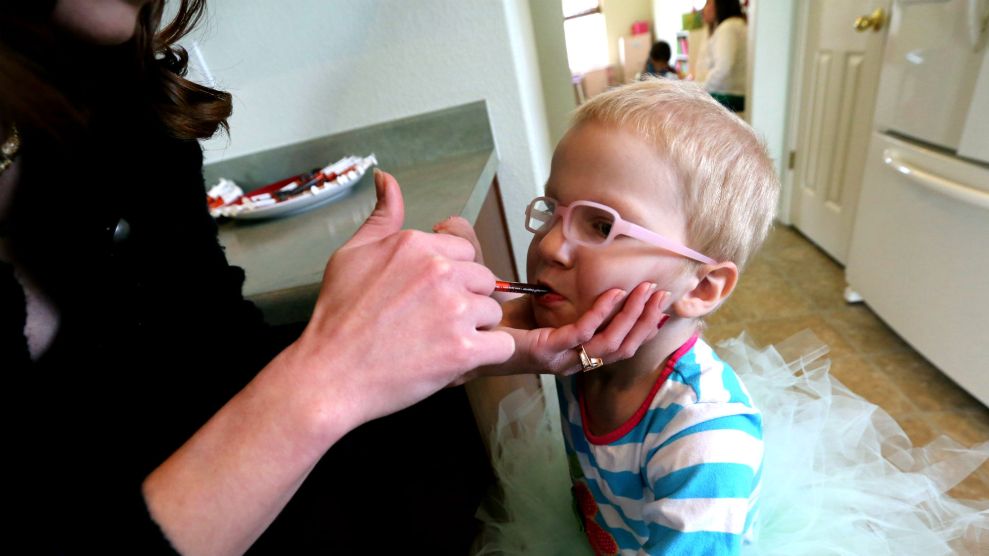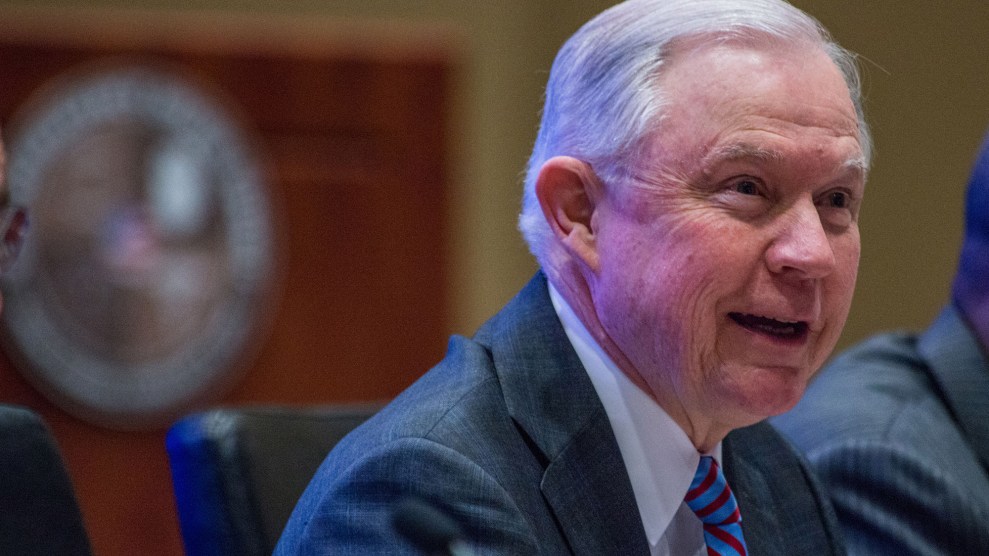
Mother Jones illustration
Over the past several months, Utah voters have been gearing up to vote on Proposition 2, a first-of-its-kind ballot initiative aimed at legalizing medical cannabis statewide this November. It was polling well—64 percent of Utahns were in favor of the measure in September—but the initiative was also opposed by some of the state’s major power players: popular Republican Gov. Gary Herbert, the Utah Medical Association, and, crucially, the Church of Jesus Christ of Latter-day Saints.
That all changed on October 4, when Herbert surprised the state with an announcement that Utah will pass a “compromise bill” to legalize medical marijuana after Election Day, no mater how people vote on Prop 2.
The move marks a major victory for backers of Prop 2, particularly DJ Schanz, the founder of the Utah Patients Coalition, the group that proposed the initiative in 2017. Schanz, who is a member of the Church of Jesus Christ, has been working to pass a form of medical marijuana in the state for years and tells Mother Jones the compromise bill is a direct result of the ballot initiative and the pressure it put on legislators. And while he says he was “skeptical” of the idea of a compromise bill at first, he feels it is a “huge win” for patients who rely on medical cannabis and for all Utahns.
Herbert’s deputy chief of staff, Paul Edwards, agrees, telling Mother Jones Prop 2 did in fact help “catalyze public opinion” on medical marijuana. He notes that 10 years ago, this resolution would have been virtually unheard of in the solid-red state of Utah. “No one would have believed it—they would have said, ‘What are you smoking?'” he joked. “That’s where we find ourselves today.”
The governor’s announcement came after weeks of sometimes-tense negotiations between proponents and opponents of Prop 2. The conversation began when Republican Speaker of the Utah House Greg Hughes, a friend of Schanz, recognized common goals between the sides—including a desire to help patients in need of pain relief and a concern for public safety—and organized a meeting in his office at the Capitol. On the pro side were Schanz and Connor Boyack, president of the Libertas Institute, a libertarian–leaning think tank devoted to “removing obstacles that limit freedom” for Utahns, including state income tax, federal funding, and required education for children. The opposition was formidable, including representatives from the Church of Jesus Christ of Latter-day Saints, the Utah Medical Association, and the Utah House, Senate, and governor’s office.
“After a couple of meetings, it finally got to the point where we could talk about specifics of the proposal, Prop 2: what their specific concerns were, and if there were ways to address them, as I say it, with a scalpel rather than a sledgehammer,” Boyack tells Mother Jones. “Forty-plus hours of meetings later, we ended up with this agreement.”
Before now, the closest the state ever came to legalizing medical marijuana was in February 2016, when the state Senate passed SB 73, which would have authorized the drug to treat a selection of specific medical conditions including HIV, cancer, and chronic pain. Schanz had lobbied for the bill as vice president of the Libertas Institute and watched from the crowded Senate gallery as it passed and viewers exploded in applause. But the victory was short-lived; less than a month later, the bill died quietly in a House committee.
“At that point, I knew that we’d never get anything substantive to happen in the Legislature,” Schanz said, when Mother Jones spoke with him about Prop 2 in August. “The only way to get this passed was to a do a citizens’ initiative, to take it to the people.”
Following SB 73’s failure, Schanz decided to more fully focus on medical marijuana, an issue that became deeply important to him after after a friend lethally overdosed on opioids nearly a decade ago. After his friend’s death, Schanz began researching non-addictive substitutes for painkillers, and “cannabis shot out as a clear alternative” for people suffering from chronic pain, he said. “I thought, well, this is a no-brainer.” He created the Utah Patients Coalition and submitted a petition for a medical cannabis initiative with the lieutenant governor in June 2017. By April 2018, it had gained nearly 200,000 signatures—more than enough to appear on the ballot in November.
The Utah Patients Coalition worked with the Libertas Institute to appeal to patients locally who could benefit from legal cannabis or had used it in other states. But Schanz told Mother Jones the campaign also made a point to target suburbanites who hadn’t made up their minds on medical pot. Money surged in from patients, Dr. Bronner’s Soaps (while not local, the company is a long-time advocate of drug policy reform), and the Marijuana Policy Project, a national cannabis advocacy group. In all, the campaign for Prop 2 raised more than $800,000, according to documents filed with the lieutenant governor’s office.
Compared to other states’ medical cannabis programs, Prop 2 is a relatively conservative measure. For example, it would ban smoking cannabis and home cultivation in most cases, and restrict the number of cannabis businesses to one per 150,000 residents in a county. Even still, it proved particularly controversial in a state where 54 percent of people identify as Republican, 55 percent of the state’s adults are members of the Church of Jesus Christ (compared to 1.6 percent nationally), and where alcohol consumption, which is forbidden for Church members, is tightly regulated.
It’s likely no surprise, then, that smoking marijuana and home cultivation polled “extremely low” among Utah voters, according to Schanz, and even less of a surprise that many people feared Prop 2 would open the floodgates for users hoping to abuse a legal medical marijuana market. Even though proponents asserted that was never the intention, Drug Safe Utah, an opposition group, generated a series of radio advertisements that falsely claimed “medicinal marijuana is already legal in Utah” and that “your doctor can prescribe it, or you can buy it over the counter.” The group conducted telephone calls which claimed things like, if Prop 2 passes, the police “will no longer enforce marijuana laws.” In all, the opposition group raised nearly $770,000 from big donors, including the owner of pharmaceutical company Pharmics, Inc., Walter J. Plumb. (Plumb was not particularly happy with the compromise bill, telling the Salt Lake Tribune, “I like to win things. This would not be my style. I would not negotiate with [the Utah Patients Coalition].”) Drug Safe Utah did not respond to a request for comment from Mother Jones.
At a May debate, Republican Senate candidate Mitt Romney firmly came out against the measure, saying, “This ballot initiative is not really medicinal marijuana…It’s going to open the door to corner stores selling marijuana-laced brownies and gummy bears. You’re going to have marijuana in our schools across our state. That is not the right way to go.” (His campaign did not respond to a request for comment from Mother Jones about the new compromise bill.) His Republican opponent in the debate, Mike Kennedy, largely agreed.
But the measure’s most influential opponent was without a doubt the Church of Jesus Christ of Latter-Day Saints. Though the Church claims it does not object to “doctor-prescribed” medicinal marijuana delivered “through a licensed pharmacy,” in August, it explicitly called on voters to vote no on Prop 2. “We are deeply concerned by the history of other states that have allowed for medical or recreational use of this drug without the proper controls and have experienced serious consequences to the health and safety of their citizens,” church leaders said in a press release at the time. “Join us in a call to state elected officials to promptly work with medical experts, patients, and community leaders to find a solution that will work for all Utahns, without the harmful effects that will come to pass if Proposition 2 becomes law.”
At the time, some members of the Church of Jesus Christ were hurt by its stance on Prop 2. “[The Church] is supposed to be—it’s preached as compassion and caring and accepting and non-judgmental, and I’m just not seeing any of those things specific to this issue,” David Cromar, a Church member, told Mother Jones in August. Cromar’s family has moved between Utah and Colorado to treat his son’s epilepsy with medical marijuana and he helped campaign for Prop 2. The Church of Jesus Christ in Colorado, he says, was accepting of his son’s cannabis treatment.
But, after September’s negotiations, the Utah Church changed its tune: “Many, many people have worked tirelessly to craft a community solution to alleviate human pain and suffering, and we’re thrilled to be part of that conversation,” said Elder Jack Gerard, a General Authority Seventy of the Church, in a press release on October 4. What’s more, the Utah Medical Association now supports the bill, one of few state medical associations—out of the 60 percent of states with some form of legal medical marijuana—to support their state’s medical marijuana program. (The Church of Jesus Christ and the Utah Medical Association did not respond to Mother Jones‘ request for comment.)
Not everyone is on board with the compromise. Earlier this month, state Rep. Angela Romero, a Democrat, criticized the bill, though not because of its content. She’s instead worried that it could dial back voter turnout in November. “I see it as a form of voter suppression,” she told Salt Lake City’s Fox 13. “People need to make sure that they vote and they’re part of this political process.”
While the proposed bill is a win for cannabis advocates, it is nothing like what you’d see in blue states like California or Washington. “At the end of the day, we are a conservative state,” Schanz said. “This is going to be done in a conservative, regulated manner.” Like Prop 2, the bill will prohibit cannabis in smokable forms and home cultivation, but it also reduces the number of qualifying conditions for cannabis use, bans the sale of edibles like cannabis-infused cookies and brownies, implements a new central-fill pharmacy distribution center (as opposed to all distribution by dispensaries), and requires medical cannabis to be sold in individually wrapped, up to 1-gram doses to distinguish between legal and illegal cannabis flower. It also allows only medical doctors and osteopathic physicians to prescribe the drug, rather than physician assistants or nurses, which would have been permitted with Prop 2.
“Two years ago, there would have been no chance of a movement like this,” Schanz says. “It just shows the type of movement that’s happened here in Utah and across the country to no longer criminalize these patients and accept them as our brothers and sisters.”
And supporters hope that Utah can now be an example for other conservative states. “Having worked on this for a few years, our feeling has been, if we are able to tip Utah, other deeply red states, especially the Bible states, can soon follow,” says Boyack. “We’re creating a model of not only the bill language itself, but also the process by which we got there.”
Image credit: D Ramey Logan/Wikipedia; iStock photo/Getty

















